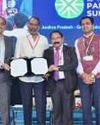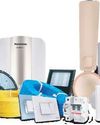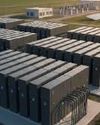試す 金 - 無料
Advancing Pumped Storage Hydropower for Future Energy Needs
EPR Magazine (Electrical & Power Review)
|September 2024
In its report, the Energy and Resources Institute TERI) has strongly emphasised the need to create large-scale Pump Storage Projects PSPs), which are most attractive and essential for optimal utilisation of the rapidly increasing solar capacity, reliable supply and grid stability.
-

India’s ambitious renewable energy targets necessitate a robust pumped hydro storage policy, which is crucial for grid stability, efficient energy management, and achieving sustainability goals amidst rapid renewable expansion.
Upcoming pumped hydro storage policy
At COP26, India made significant commitments to address climate change, underscoring its dedication to sustainable development. By 2030, the country aims to achieve a non-fossil energy capacity of 500 GW and ensure that 50 percent of its energy requirements are met through renewable sources. Additionally, the country is committed to reducing its total projected carbon emissions by one billion tonnes by 2030 and lowering the carbon intensity of its economy by 45 percent compared to 2005 levels. Looking further ahead, the nation has set an ambitious target to achieve net-zero emissions by 2070, signalling its long-term commitment to combating climate change.
Further, based on generation planning studies carried out for the period of 2027-32 by Central Electricity Authority (CEA), the likely installed capacity for the year 2031-32 is 900,422 MW comprising 304,147 MW of conventional capacity (coal259,643 MW, gas–24,824MW, nuclear-19,680MW) and 596,275MW of renewable-based capacity (large hydro-62,178 MW, solar-364,566MW, wind-121,895MW, small hydro5450MW, biomass-15,500 MW, PSP26,686MW; excluding 5856 MW of likely hydro based imports).
The storage capacity requirement is expected to increase to 73.93 GW (26.69 GW PSP and 47.24 GW BESS) with storage of 411.4 GWh (175.18 GWh from PSP and 236.22 GWh from BESS) by the year 2031-32. In a recent study, CEA indicated that India has a potential of 103 GW of ‘on-river pumped storage’ capacity, with many off-river pumped storage potentials also available.
このストーリーは、EPR Magazine (Electrical & Power Review) の September 2024 版からのものです。
Magzter GOLD を購読すると、厳選された何千ものプレミアム記事や、10,000 以上の雑誌や新聞にアクセスできます。
すでに購読者ですか? サインイン
EPR Magazine (Electrical & Power Review) からのその他のストーリー

EPR Magazine (Electrical & Power Review)
Wirepas certification a major step toward India's upcoming phase of AMI deployments
The Wirepas Certified programme is a major advancement for India's massive AMI deployments. This affirms device suitability for the diverse and challenging environments in the country. Teppo Hemiä, CEO of Wirepas discusses more with EPR.
2 mins
December 2025

EPR Magazine (Electrical & Power Review)
BESS becoming the backbone of power capacity additions
India is undergoing a rapid clean energy revolution, aiming to deploy 500 GW of non-fossil capacity by 2030, of which it has already reached 250 GW.
6 mins
December 2025

EPR Magazine (Electrical & Power Review)
Transformer industry undergoes evolution to meet capacity addition
The projected increase of over 433,000 MVA in substation capacity nationwide has served as a guiding force for the transformer sector. Amit Varshney shares his expertise in talks with EPR.
3 mins
December 2025

EPR Magazine (Electrical & Power Review)
RenewSys elevates solar module reliability with advanced encapsulant technologies
To enhance the efficiency and reliability of its products, RenewSys has introduced advanced encapsulants and backsheets, including AA EVA (Anti-Acid) to combat internal corrosion, ENT POE to guarantee PID-free performance, and environmentally friendly options like the Green Backsheet.
2 mins
December 2025
EPR Magazine (Electrical & Power Review)
REC facilitates MoU between MePDCL and CPRI for quality testing in Meghalaya
REC Limited, a Maharatna Public Sector Enterprise under the Ministry of Power and a leading NBFC, has successfully mediated a crucial Memorandum of Understanding (MoU) between Meghalaya Power Distribution Corporation Limited (MePDCL) and the Central Power Research Institute (CPRI).
1 min
December 2025

EPR Magazine (Electrical & Power Review)
SECI, Andhra finalise 1200 MWh BESS and 50 MW hybrid project
Solar Energy Corporation of India Limited (SECI), a Navratna CPSU under the Ministry of New & Renewable Energy (MNRE), Government of India, has exchanged Government Orders (GOs) with the Government of Andhra Pradesh for the development of a 1200 MWh Battery Energy Storage System (BESS) at Nandyal and a 50 MW Hybrid Solar Project.
1 min
December 2025

EPR Magazine (Electrical & Power Review)
Convergence of digitalisation, automation, and electrification is the foundation of next-gen infra
Panasonic Life Solutions India is on a mission to contribute to reliable, sustainable electrification across various sectors in the country. Shahab Naqvi shares insights about the company's strategies in talks with EPR. Let us know more from him.
3 mins
December 2025

EPR Magazine (Electrical & Power Review)
FY26 to attract $20-25 bn in renewable investments in India
The renewable energy sector in India has just hit a turning point. Between April and August 2025, the country added a record 20.1 gigawatts (GW) of renewable power capacity, a 123 per cent increase compared to the same period last year, when additions totalled just 9 GW. According to data from the Ministry of New and Renewable Energy (MNRE) and market observers like ICRA, this pace positions India to cross 35 GW of new capacity by the end of FY26, the highest annual addition in its clean-energy history.
3 mins
December 2025

EPR Magazine (Electrical & Power Review)
Wirepas certification a major step toward India's upcoming phase of AMI deployments
This certification provides DISCOMs and AMISPs with confidence that a device has passed the toughest real-world tests for scalability, interoperability and reliability.
2 mins
December 2025

EPR Magazine (Electrical & Power Review)
Renewable surge strains the grid as storage strengthens stability
The CEA mandates co-located ESS (approx. 2 hours) for new solar projects, aiming to reach 60 GW of storage by FY 2032 (including 42 GW of BESS and 19 GW of pumped hydro).
3 mins
December 2025
Listen
Translate
Change font size
